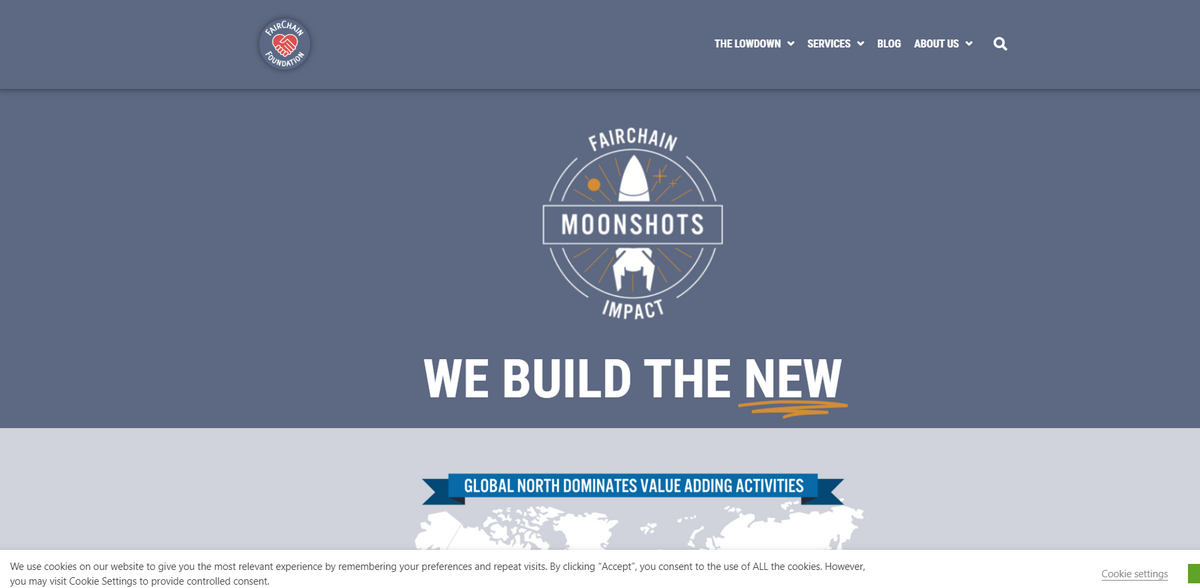What is FairChain?
FairChain presents a new mindset to rethink economics and tackle 21st-century challenges while honouring planetary boundaries. At its core, FairChain believes that tomorrow’s economies will be driven by inclusive business models that blend entrepreneurial competitiveness with genuine social impact. The project champions a shared commitment to positive value creation – ensuring that all participants in the value chain receive their fair share. Radical transparency, equal partnerships, and cutting-edge technologies are at the heart of this approach, which aims to rebalance how wealth is distributed across global supply chains…
Main Benefits of the Project
Key aspects of FairChain include:
- Transforming business thinking into demand-driven theories of change
- Building cross-sector partnerships between businesses, NGOs, and Governments
- Substituting traditional development aid with sustainable consumption models
- Utilizing blockchain applications for transparent supply chains and value distribution
- Empowering stakeholders via interactive consumer experiences that amplify impact
The Underlying Problem
Power imbalances, negative externalities, and the ever-widening gap in wealth distribution have long been challenges that plague conventional market models. For centuries, profit-driven multinationals have perfected the art of selling premium products at colossal prices while securing their raw material inputs at rock-bottom levels and producing them with little regard to the negative externalities they generate. Such dynamics have created conditions where developing economies struggle to ascend in the value chain or realize a living income. This imbalance has steeped global markets in practices that, although seemingly profitable, continue to fuel economic and social instabilities…
Innovative Methodology in Action
FairChain’s approach is anything but conventional. By adopting a methodology grounded in radical transparency and equal partnerships, the initiative uses cutting-edge technologies to support business models that truly share the created wealth. This method carefully transforms innovative ideas into actionable impact roadmaps, which, when amplified by interactive consumer experiences, resonate loudly through all channels and stakeholders. It is all about creating an ecosystem where every contributor—from the grassroots farmer to the multinational conglomerate—plays a real role in addressing global inequalities.
Collaborative Impact and Future Forward Projects
Collaboration sits at the heart of FairChain. By building impact consortia, this model transforms development challenges into opportunities for inclusive growth. Projects such as those launched with Moyee Coffee illustrate how connecting the last mile to the first can create environments where farmers receive fair prices and pave the way toward a living income. Similarly, partnerships with Hoja Verde and the United Nations have introduced innovative applications in the chocolate industry that use blockchain to ensure that every step along the supply chain is transparent. Such collaborations are not merely projects; they are testimonies to the power of aligning business success with social and environmental responsibility…
Addressing Negative Externalities
A critical aspect of FairChain’s narrative is its focus on the negative externalities of traditional profit-driven practices. For too long, global supply chains have fostered a situation whereby large multinationals capture disproportionate value. In the post-colonial era, it is estimated that 24 times more value was extracted from the global South than the amount disbursed by development aid. The FairChain model challenges this status quo by striving for a truly fair distribution of wealth. It sends a powerful message that market forces and capitalism on their own are insufficient to ensure democratic ideals or prevent the concentration of wealth—which ultimately undermines sustainable development and social cohesion.
Project Impact on Sustainable Development Goals
- SDG 1 – No Poverty: Providing fair incomes and more equitable share of value for all stakeholders
- SDG 8 – Decent Work and Economic Growth: Driving inclusive economic models and fair distribution of wealth
- SDG 12 – Responsible Consumption and Production: Promoting sustainable consumption practices through transparent supply chains
- SDG 13 – Climate Action: Encouraging business methodologies that reduce climate impact and deforestation
- SDG 15 – Life on Land: Empowering local economies to sustainably manage natural resources
The Road Ahead
FairChain is continuously evolving, with future forward projects setting the stage for more inclusive and sustainable economic practices. As seen in the collaboration with Moyee Coffee, where fair pricing and sustainable supply chain practices come together, the initiative signals a shift away from outdated models of development aid and towards systems that truly empower and benefit all. These dynamic partnerships, underscored by radical transparency and innovative technology, are changing the narrative—from one of exploitation to one of shared value. With every impact consortium formed and every new blockchain application implemented, FairChain reinforces the idea that a fairer world is not only possible but already within reach.


















